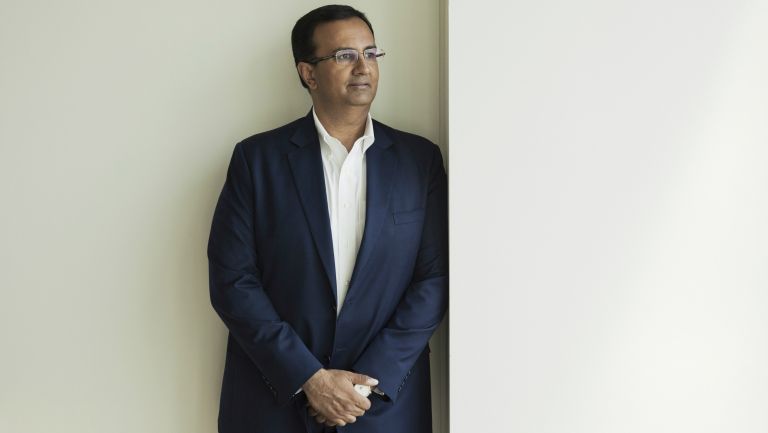
Insights: Baihas Baghdadi
Barclays Global Head of Trade and Working Capital, Baihas Baghdadi understands the importance of exports in driving UK economic and business growth

Simon Betteridge is Barclays' Director of Savings Pricing, Proposition and Commercial. A qualified chartered accountant, Betteridge joined Barclays 11 years ago and tells us why many people aren’t saving enough for their future – and how Barclays is staying relevant in a changing market.
One of the overwhelming trends in our society is the increasing pressure on people to spend. While the cost of living – when you consider staples like bread and milk – has come down, the ease with which we can all now purchase goods and services has had the effect of driving the cost of living up.
From grabbing a daily coffee on the go, to having the latest tech or a regularly changing wardrobe, this is fast becoming the new norm. It’s all a far cry from the way my father would produce his little red book when budgeting for the month ahead.
For many years, we’ve been failing to save enough, leading to greater challenges for everyone from millennials to retirees. It’s due to a number of things – struggling to make ends meet, an unwillingness to save due to other priorities, or perhaps a lack of understanding about how much you need to put by to buy a property or to retire comfortably.
When economists look at the slowdown in saving they tend to focus on broad brush macro-economic factors, such as the low interest rates that have dominated the UK landscape in recent years. The base rate of 0.25-0.5 per cent that has been in place for much of the period since the global financial crisis has led to returns on savings being at -c.2 per cent in this decade compared to +c.3 per cent in the 1990s.
The fact that inflation is also outpacing the return on savings might be a factor that puts people off saving, but there is also a vast array of cultural and social changes at play, including the easy availability of credit which can fuel a culture of impulse buying rather than saving towards goals. And finance providers have often failed to engage effectively with people to help them plan for key life events.
For millennials, there is the added challenge of having to address often very large student loans – although they may not start having to pay them back for some time. Having large debts overhanging can make young people feel on the back foot with their finances, as a result of which they feel less encouraged to save and manage a budget.
This generation is also having to face a tough job market which can make the prospect of saving and earning enough to own a property seem like an impossible dream. This could also be the first generation to expect to earn less than their parents – but it could also be the generation that becomes the biggest inheritors.
Their parents – ‘Generation X’ – may have had greater job security, but they also face challenges. The cost of bringing up children is greater than ever – according to research conducted for the Centre for Economic and Business Research, parents spend £60,000 on average for school-related things.
They also might be having to look after their grown up children, who may have returned to the family home to save money – there are inevitably pressures on household budgets if the ‘bank of mum and dad’ is in business.
But the pressure extends further. This ‘sandwich’ generation are increasingly finding themselves looking after their parents, who are living longer and may need more care.
Given the continual changes in the job market, in addition to family pressures, they may also end up working in the ‘gig economy’. This may offer greater flexibility, but there is a risk of not saving enough in the long run.
For baby boomers, there is the concern that they don’t have enough in the way of savings and pensions to maintain a comfortable lifestyle. These anxieties have been reflected in research by YouGov, which found that 28 per cent of over-55s would not have enough savings to rely on if things got tough.
The number who felt uncomfortable without an adequate pot of savings set aside was 71 per cent. In that respect, many from the retiring generation – the ‘baby boomers’ – are keen to find out how far their pensions and savings will stretch when they finish work, so retirement planning is very important for them.
In an age when the ‘savings ratio’ continues to go down, there is real concern being felt by each generation that they will struggle to save for things they need, like a first property or being able to make ends meet in later life.
On top of that there are more general concerns across the generations when it comes to money and savings in areas such as fraud – especially online security – and the lack of personal touch that the digital age brings to financial services.
There is now more demand than ever to understand the various societal shifts that are underpinning this behaviour.
Efforts to promote more competition in banking have not necessarily resulted in more customer engagement, as new entrants have focussed on offering attractive short-term rates that typically expire after a two-year term. What’s needed is more in-depth engagement with customers throughout the different stages of their financial lives so that they can afford the things they desire, be that a holiday, a car or a home and a comfortable retirement.
By offering the right engagement at the right time, we can make this happen by staying relevant and providing the right support along the way. The pace and scale of change affecting the savings market will only accelerate, which makes it all the more important that we push harder to offer the right tools, guidance, encouragement and rewards to really engage our customers with saving.

Barclays Global Head of Trade and Working Capital, Baihas Baghdadi understands the importance of exports in driving UK economic and business growth

As Head of Omnichannel and Customer Experience at Barclays, Raheel Ahmed heads a team that deals with two billion ‘customer interactions’ every year

Dambisa Moyo is a Zambian-born economist and author who has been a Non-Executive Director with Barclays since 2010

As Head of Ways of Working at Barclays, Jonathan Smart finds ways to help the bank achieve “better, faster, safer, happier” outcomes